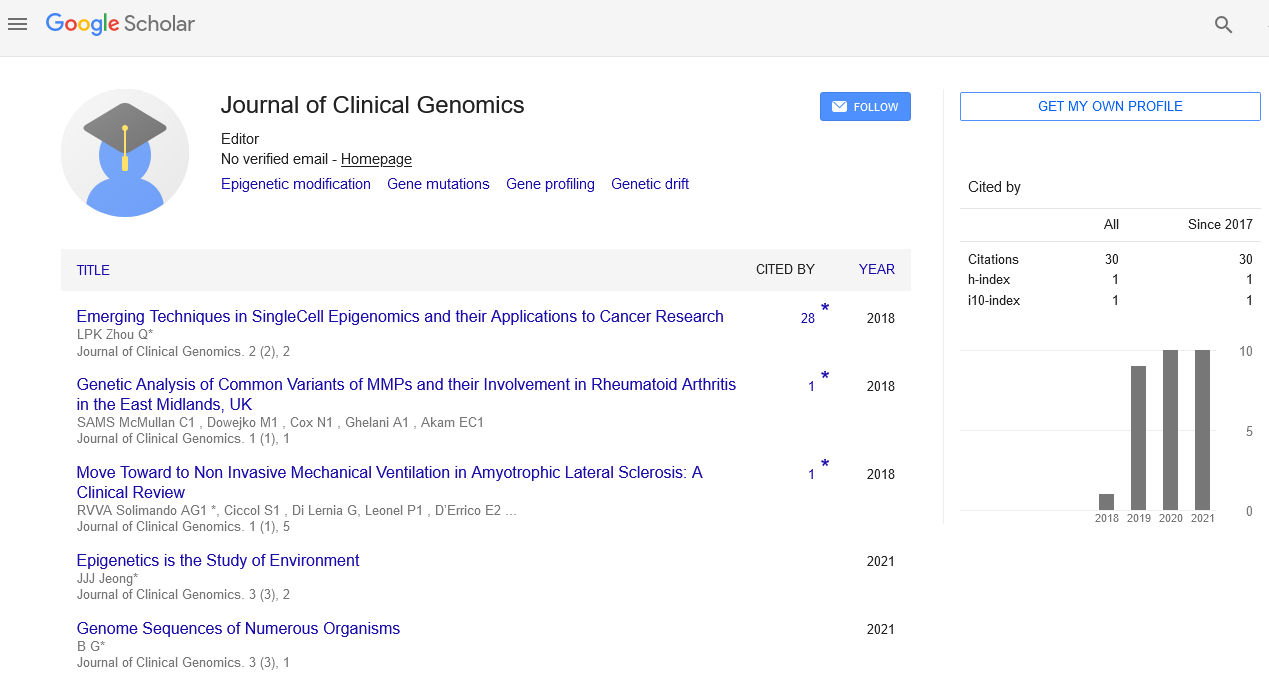Opinion Article, J Clin Genom Vol: 5 Issue: 3
Genomic Variation and Disease Susceptibility: Unraveling the Complex Interplay
Deli Cheng*
1Department of Bio & Brain Engineering, Korea Advanced Institute of Science and Technology, South Korea
*Corresponding Author: Deli Cheng,
Department of Bio & Brain Engineering,
Korea Advanced Institute of Science and Technology, South Korea
E-mail: chengdeli5@gmail.com
Received date: 02 September, 2023, Manuscript No. JCG-23-116285;
Editor assigned date: 04 September, 2023, PreQC No JCG-23-116285 (PQ);
Reviewed date: 18 September, 2023, QC No JCG-23-116285;
Revised date: 25 September, 2023, Manuscript No JCG-23-116285 (R);
Published date: 05 October, 2023, DOI: 10.4172/JCG.1000139.
Citation: Cheng D (2023) Genomic Variation and Disease Susceptibility: Unraveling the Complex Interplay. J Clin Genom 5:3.
Description
Genomic variation plays a pivotal role in disease susceptibility. It delves into recent advancements in identifying genetic markers and their implications for personalized medicine. The human genome is not a static entity but a dynamic blueprint susceptible to variations. Genomic variations, encompassing single nucleotide changes, structural rearrangements, and copy number variations, significantly influence an individual's predisposition to diseases. Understanding this complex interplay between genomic variation and disease susceptibility is crucial for advancing our knowledge of genetic diseases and improving personalized healthcare.
Genomic Variations
Single Nucleotide Polymorphisms (SNPs) are the most prevalent type of genomic variation. They are present at a frequency of at least 1% in the population and often contribute to the genetic architecture of common diseases.
Rare variants, on the other hand, have a frequency of less than 1% in the population. Although individually rare, they can have a substantial impact on disease susceptibility when associated with specific conditions. Many common diseases, such as diabetes, heart disease, and psychiatric disorders, result from a complex interplay of multiple genetic variants. This polygenic inheritance pattern involves both common and rare variations, making it challenging to pinpoint causative factors.
Mendelian disorders, characterized by single-gene mutations, often result from rare variants with large effects. These disorders provide valuable insights into the link between rare genomic variations and disease.
Genome-Wide Association Studies (GWAS) have been instrumental in identifying common genetic markers associated with various diseases. These studies analyze the genomes of thousands of individuals to identify SNPs linked to disease susceptibility. Advancements in sequencing technologies have made it possible to explore rare genomic variations. Whole-Exome Sequencing (WES) and Whole-Genome Sequencing (WGS) enable the detection of rare variants and their role in disease.
Understanding the functional consequences of genomic variants is essential. Functional genomics approaches, such as CRISPR-Cas9 gene editing and transcriptomics, help elucidate how specific genetic variations contribute to disease pathogenesis. Mutations in the BRCA1 and BRCA2 genes are rare but significantly increase the risk of hereditary breast and ovarian cancers. Genetic testing for these mutations allows for targeted preventive measures.
Type 2 diabetes is a complex disease influenced by multiple common genetic variants. GWAS have identified numerous SNPs associated with diabetes risk, shedding light on its genetic underpinnings. Genetic risk profiling can help predict an individual's susceptibility to certain diseases, allowing for early interventions and preventive measures.
Tailoring drug therapies to an individual's genetic makeup, known as pharmacogenomics, is becoming increasingly common, optimizing treatment efficacy and minimizing side effects. Insights from genomic variations are driving drug discovery efforts, with pharmaceutical companies focusing on developing drugs that target specific genetic markers associated with diseases. The increasing availability of genetic information raises ethical and privacy concerns, necessitating robust data protection and informed consent protocols. Integrating genomic data into clinical practice remains a challenge, requiring the development of standardized approaches and decision support tools. The analysis of rare variants, particularly in the context of complex diseases, poses computational and statistical challenges that need to be addressed.
Conclusion
Genomic variation is at the heart of disease susceptibility, influencing the development and progression of a wide range of conditions. Recent advancements in genomic research have shed light on the intricate relationship between genomic variations, both common and rare, and diseases. As our understanding of this complex interplay continues to evolve, it holds the results of revolutionizing personalized medicine, enabling predictive healthcare, and driving innovative drug development efforts. However, challenges related to ethics, data integration, and rare variant analysis must be addressed to fully realize the potential of genomics in healthcare.
 Spanish
Spanish  Chinese
Chinese  Russian
Russian  German
German  French
French  Japanese
Japanese  Portuguese
Portuguese  Hindi
Hindi 